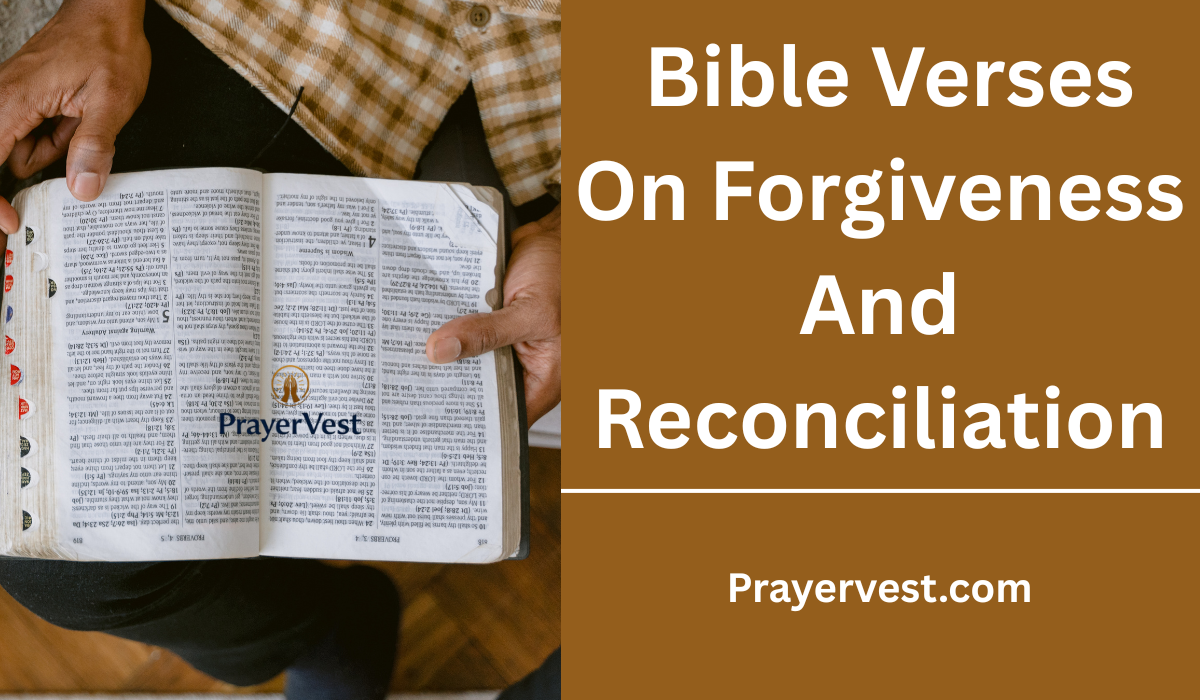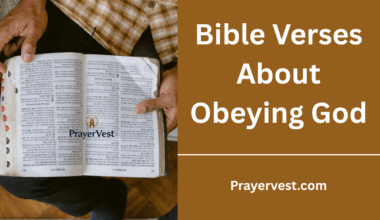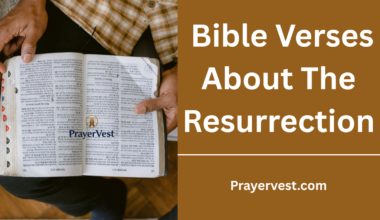God’s desire to mend damaged relationships and bring about peace is reflected in the Bible’s major themes of forgiveness and reconciliation. Scripture continually exhorts believers to forgive, let go of grudges, and embrace mercy—both in the Old and New Testaments.
Since God first forgave us via Christ, forgiveness is more than just an act of goodwill; it is a reflection of God’s character. Contrarily, reconciliation goes beyond forgiveness by restoring unity and trust, bringing those who have been estranged back into peace under God’s love. Reconciliation and forgiveness work together to show how grace can heal hurts and change lives.
According to what the Bible says, spiritual development and closeness to God depend on forgiveness. Jesus made it very evident in His teachings that our capacity to forgive others is a prerequisite for receiving God’s forgiveness. Choosing forgiveness releases us from the burden of resentment, whereas holding onto anger and bitterness damages our relationships with God and other people.
Reconciliation brings us comfort of mind and heart by reestablishing our relationship with one another as well as with ourselves. These biblical precepts serve as a reminder that forgiveness is a gift and a command that represents God’s mercy at work in us.


Anyone dealing with conflict, betrayal, or brokenness can find guidance and support by studying Bible texts on forgiveness and reconciliation. These verses teach us to provide grace even when it seems hard, demonstrating that humility and love are the ultimate sources of strength. By putting these verses into practice, we discover that Christ, who dismantles barriers of animosity and binds us together as one body, makes reconciliation possible. In the end, these verses encourage us to live in liberty, harmony, and repaired relationships, reflecting God’s desire for forgiveness in a world in dire need of it.
40 Inspiring Bible Verses On Forgiveness And Reconciliation (2026)
1. Matthew 6:14
“For if you forgive other people when they sin against you, your heavenly Father will also forgive you.”
This verse underscores the direct connection between the forgiveness we extend to others and the forgiveness we receive from God. Jesus teaches that our willingness to release others from their wrongs is a reflection of our understanding of God’s mercy. Forgiveness is not merely a kind gesture but an act of obedience that mirrors the grace God has shown us.
2. Colossians 3:13
“Bear with each other and forgive one another if any of you has a grievance against someone. Forgive as the Lord forgave you.”
Paul encourages believers to cultivate patience and extend forgiveness freely, just as Christ has forgiven us. This verse emphasizes that reconciliation begins with a heart willing to let go of grudges and show compassion. The standard for forgiveness is not our emotions or human reasoning but the sacrificial love of Christ.
3. Ephesians 4:32
“Be kind and compassionate to one another, forgiving each other, just as in Christ God forgave you.”
This verse calls Christians to embody kindness and compassion in their daily lives. Forgiveness is presented not as an optional virtue but as a necessary reflection of God’s grace. Just as we have been recipients of divine forgiveness, we are commanded to extend it to others as a testimony of God’s love at work within us.
4. Luke 17:3-4
“If your brother or sister sins against you, rebuke them; and if they repent, forgive them. Even if they sin against you seven times in a day and seven times come back to you saying ‘I repent,’ you must forgive them.”
Jesus highlights the limitless nature of forgiveness, teaching that reconciliation requires a readiness to forgive repeatedly. This passage reminds us that forgiveness is not a one-time act but an ongoing practice of grace, rooted in humility and love.
5. Mark 11:25
“And when you stand praying, if you hold anything against anyone, forgive them, so that your Father in heaven may forgive you your sins.”
Here, Jesus ties the act of forgiveness directly to our prayers. He reminds us that forgiveness is essential for unhindered fellowship with God. Holding grudges not only damages relationships with others but also blocks the flow of grace in our own lives. True prayer begins with a heart free of bitterness.
6. Psalm 103:12
“As far as the east is from the west, so far has he removed our transgressions from us.”
This psalm beautifully illustrates the completeness of God’s forgiveness. His mercy erases our sins so thoroughly that they are separated from us beyond measure. This verse reassures us that reconciliation with God is not partial but total, giving us peace and the confidence to extend such forgiveness to others.
7. 1 John 1:9
“If we confess our sins, he is faithful and just and will forgive us our sins and purify us from all unrighteousness.”
John assures believers that confession leads to cleansing. God’s forgiveness is both faithful (unchanging) and just (righteous), rooted in Christ’s sacrifice. This verse highlights the foundation of reconciliation with God—humility in confession and His promise of restoration.
8. Proverbs 17:9
“Whoever would foster love covers over an offense, but whoever repeats the matter separates close friends.”
This proverb warns against holding on to offenses or continually bringing them up. True forgiveness chooses love and lets go of the desire to rehash past wrongs. By covering offenses with grace, relationships can be healed and strengthened, fostering genuine reconciliation.
9. Matthew 18:21-22
“Then Peter came to Jesus and asked, ‘Lord, how many times shall I forgive my brother or sister who sins against me? Up to seven times?’ Jesus answered, ‘I tell you, not seven times, but seventy-seven times.’”
Peter’s question reveals a human tendency to limit forgiveness, but Jesus’ response shatters any boundaries. Forgiveness in God’s kingdom is endless and unconditional, reflecting the immeasurable grace He extends to us. This passage teaches that forgiveness should never be calculated but freely given.
10. Isaiah 1:18
“Though your sins are like scarlet, they shall be as white as snow; though they are red as crimson, they shall be like wool.”
God’s invitation here is one of reconciliation, offering forgiveness that transforms. Sin, no matter how deep, can be washed away by His mercy. This verse captures the heart of God’s redemptive love, promising purity and restoration to all who turn to Him in repentance.
11. Micah 7:18-19
“Who is a God like you, who pardons sin and forgives the transgression of the remnant of his inheritance? You do not stay angry forever but delight to show mercy. You will again have compassion on us; you will tread our sins underfoot and hurl all our iniquities into the depths of the sea.”
This powerful passage magnifies the uniqueness of God’s mercy. Unlike humans, who often cling to anger, God delights in forgiveness and compassion. His forgiveness is so complete that sins are trampled underfoot and cast into the depths of the sea, never to return. This is a vivid picture of divine reconciliation that assures believers that God’s mercy is greater than their failures. It teaches us that reconciliation is not about keeping score but about releasing others with the same compassion that God continually shows us.
12. Matthew 5:23-24
“Therefore, if you are offering your gift at the altar and there remember that your brother or sister has something against you, leave your gift there in front of the altar. First go and be reconciled to them; then come and offer your gift.”
Jesus emphasizes the importance of reconciliation even above acts of worship. Broken relationships hinder our fellowship with God, and He calls us to make peace before presenting our offerings. This verse challenges us to confront unresolved conflicts and pursue reconciliation as an act of obedience. It demonstrates that forgiveness is not optional but a priority in the life of a believer who desires authentic communion with God.
13. Romans 12:18
“If it is possible, as far as it depends on you, live at peace with everyone.”
Paul acknowledges that reconciliation may not always be fully achievable, but he urges believers to take responsibility for their part in making peace. Forgiveness begins with a choice to let go of bitterness, even when others may not reciprocate. This verse reminds us that the call to reconciliation is about doing our best to reflect Christ, trusting God with the outcome. It is an invitation to live above offense, valuing peace over pride.
14. Psalm 86:5
“You, Lord, are forgiving and good, abounding in love to all who call to you.”
This verse highlights the heart of God as both forgiving and overflowing with love. His mercy is not scarce or limited but abundant for all who humbly seek Him. The psalmist reminds us that reconciliation with God is readily available, no matter how far we have strayed. It encourages us to approach Him with confidence, knowing His nature is to forgive, and it challenges us to mirror that same generosity of spirit in our relationships with others.
15. 2 Corinthians 5:18-19
“All this is from God, who reconciled us to himself through Christ and gave us the ministry of reconciliation: that God was reconciling the world to himself in Christ, not counting people’s sins against them. And he has committed to us the message of reconciliation.”
Paul teaches that reconciliation is at the very core of the gospel. Through Christ, God not only forgives our sins but also entrusts us with the mission of spreading reconciliation to others. Forgiveness is not meant to stop with us—it flows through us to heal broken relationships and restore peace. This passage makes clear that reconciliation is both a gift and a calling, positioning believers as ambassadors of God’s grace in a divided world.
16. Hebrews 8:12
“For I will forgive their wickedness and will remember their sins no more.”
This verse points to the new covenant established through Christ, where forgiveness is complete and final. Unlike human forgiveness, which often struggles to forget, God promises to remember our sins no more. This shows the depth of His grace—He chooses not to hold our past against us. It reassures us that reconciliation with God is permanent, freeing us from guilt and giving us the confidence to live as redeemed children. It also serves as a model for our own relationships: forgiveness should not only be spoken but lived out by refusing to continually bring up past offenses.
17. James 5:16
“Therefore confess your sins to each other and pray for each other so that you may be healed. The prayer of a righteous person is powerful and effective.”
This verse ties together confession, prayer, and healing. Reconciliation is not just about restoring peace with others but also about experiencing spiritual and emotional healing. Confession humbles us, prayer strengthens us, and forgiveness opens the door to restoration. This passage reminds us that reconciliation is a community effort, where believers support one another in grace and truth. It highlights the power of vulnerability and prayer in building stronger, more Christlike relationships.
18. Matthew 18:15
“If your brother or sister sins, go and point out their fault, just between the two of you. If they listen to you, you have won them over.”
Jesus gives practical guidance for reconciliation by emphasizing private, respectful confrontation. Instead of spreading offenses or harboring bitterness, He calls us to address conflicts directly and lovingly. The goal is not to win arguments but to win back relationships. This verse shows that reconciliation requires both honesty and humility, and when approached with love, it can turn conflict into an opportunity for growth and deeper unity.
19. Nehemiah 9:17
“But you are a forgiving God, gracious and compassionate, slow to anger and abounding in love. Therefore you did not desert them.”
In this confession of Israel’s sins, God’s nature shines through as forgiving and compassionate. Despite repeated rebellion, He remained patient and abounding in love. This verse reassures us that God’s forgiveness is not easily exhausted, even when we fall short multiple times. His mercy not only restores but also sustains us, proving that reconciliation is rooted in His steadfast character. For us, it is a call to extend the same patience and enduring love to those who have wronged us.
20. Luke 6:37
“Do not judge, and you will not be judged. Do not condemn, and you will not be condemned. Forgive, and you will be forgiven.”
Jesus teaches that forgiveness and mercy are directly connected to the way we treat others. A judgmental and condemning spirit creates division, while a forgiving spirit opens the door to reconciliation and blessing. This verse challenges us to adopt a posture of grace rather than criticism, knowing that the measure we use with others is the same measure that will be used with us. Forgiveness here is portrayed not as weakness, but as a strength that breaks the cycle of resentment and restores peace.
21. 2 Chronicles 7:14
“If my people, who are called by my name, will humble themselves and pray and seek my face and turn from their wicked ways, then I will hear from heaven, and I will forgive their sin and will heal their land.”
This verse shows the powerful link between humility, repentance, and God’s forgiveness. When God’s people acknowledge their sins and sincerely seek His presence, He promises both forgiveness and healing. Reconciliation here is not only personal but also collective—when communities repent, God restores. It teaches us that true forgiveness requires humility and change, and that reconciliation brings not only peace with God but also restoration to the brokenness around us.
22. Psalm 32:5
“Then I acknowledged my sin to you and did not cover up my iniquity. I said, ‘I will confess my transgressions to the Lord.’ And you forgave the guilt of my sin.”
David’s testimony reveals the freedom that comes through confession. Hiding sin leads to guilt and shame, but when he acknowledged his transgressions, forgiveness and relief followed. This verse assures us that God does not withhold forgiveness when we come to Him with honesty. Reconciliation begins when we stop hiding and start confessing, allowing God’s mercy to cleanse and heal us. It also encourages us to cultivate transparency in our relationships, fostering deeper trust and reconciliation.
23. Mark 2:5
“When Jesus saw their faith, he said to the paralyzed man, ‘Son, your sins are forgiven.’”
In this miracle, Jesus demonstrates that forgiveness is even greater than physical healing. The man’s paralysis was visible, but his deeper need was reconciliation with God. Forgiveness is portrayed here as life-changing, restoring both spiritual identity and hope. This verse teaches us that no matter our outward struggles, the greatest gift Christ offers is forgiveness, which reconciles us to God and sets us free from the bondage of sin.
24. Genesis 50:20
“You intended to harm me, but God intended it for good to accomplish what is now being done, the saving of many lives.”
Joseph’s words to his brothers reveal the power of forgiveness and reconciliation. Though they betrayed him, Joseph chose to see God’s hand at work in his suffering. His willingness to forgive not only healed his family but also fulfilled God’s greater plan. This verse shows that forgiveness does not erase the wrong done but reinterprets it through God’s sovereignty, allowing reconciliation to flourish where bitterness could have taken root.
25. Matthew 26:28
“This is my blood of the covenant, which is poured out for many for the forgiveness of sins.”
At the Last Supper, Jesus reveals the ultimate foundation of forgiveness—His sacrificial blood. Through His death, reconciliation between God and humanity is made possible. This verse reminds us that forgiveness is costly, purchased through Christ’s sacrifice. It calls us to honor the depth of His love by extending forgiveness to others, recognizing that the reconciliation we enjoy with God is meant to overflow into every area of our relationships.
26. Psalm 130:3-4
“If you, Lord, kept a record of sins, Lord, who could stand? But with you there is forgiveness, so that we can, with reverence, serve you.”
The psalmist acknowledges the impossibility of standing guiltless before God if He kept account of every sin. Yet the beauty of this passage lies in the truth that God chooses to forgive. Forgiveness here inspires awe, not complacency—because God wipes our record clean, we are freed to serve Him in gratitude and reverence. Reconciliation with God transforms us into willing servants, motivated by love rather than fear.
27. Jonah 2:9
“But I, with shouts of grateful praise, will sacrifice to you. What I have vowed I will make good. I will say, ‘Salvation comes from the Lord.’”
Jonah’s prayer from the belly of the fish demonstrates repentance and recognition of God’s saving power. Though Jonah had run from God’s call, reconciliation came when he turned back in humility. This verse highlights that forgiveness restores not only our standing before God but also our purpose in Him. It reminds us that reconciliation revives mission—when forgiven, we are empowered to fulfill God’s calling with renewed gratitude.
28. Daniel 9:9
“The Lord our God is merciful and forgiving, even though we have rebelled against him.”
Daniel’s prayer on behalf of Israel reveals the depth of God’s mercy. Despite repeated rebellion, God’s nature remains merciful and forgiving. This verse assures us that forgiveness does not depend on our worthiness but on His character. Reconciliation is possible not because we deserve it but because God delights to extend mercy. It calls us to trust in His faithfulness and to reflect His mercy toward those who have wronged us.
29. Acts 3:19
“Repent, then, and turn to God, so that your sins may be wiped out, that times of refreshing may come from the Lord.”
Peter calls for repentance as the pathway to forgiveness and spiritual renewal. Forgiveness is not simply about removing guilt but about ushering in seasons of refreshing and restoration from God. This verse shows that reconciliation brings more than peace—it brings revival. It teaches us that forgiveness is the doorway to new beginnings, both spiritually and relationally.
30. Isaiah 55:7
“Let the wicked forsake their ways and the unrighteous their thoughts. Let them turn to the Lord, and he will have mercy on them, and to our God, for he will freely pardon.”
Isaiah emphasizes God’s eagerness to forgive when people turn from sin. His mercy is not reluctant but freely given. This verse reminds us that reconciliation with God is never out of reach—no matter how far we’ve wandered, His arms remain open. It calls us to forsake destructive ways and thoughts, trusting in His promise of full pardon and restoration.
31. Luke 23:34
“Jesus said, ‘Father, forgive them, for they do not know what they are doing.’ And they divided up his clothes by casting lots.”
Even as He hung on the cross, Jesus prayed for the forgiveness of His executioners. This verse captures the radical depth of divine forgiveness, extended even to those actively causing harm. It challenges us to forgive not only when it is easy but also when it seems impossible. Reconciliation here is costly, yet it reflects the heart of Christ, who teaches us to overcome hatred with mercy.
32. Romans 5:10
“For if, while we were God’s enemies, we were reconciled to him through the death of his Son, how much more, having been reconciled, shall we be saved through his life!”
Paul highlights the transformative power of Christ’s sacrifice. Reconciliation was made possible not when we were righteous, but when we were still enemies of God. This demonstrates that forgiveness is an act of grace, not merit. The verse reassures us that if God loved us enough to reconcile us through Christ’s death, He will certainly sustain us in His life. It inspires confidence in God’s enduring commitment to our redemption.
33. Matthew 9:6
“But I want you to know that the Son of Man has authority on earth to forgive sins.” So he said to the paralyzed man, ‘Get up, take your mat and go home.’”
Here, Jesus reveals His divine authority to forgive sins, confirming His power through physical healing. The forgiveness He offers is not symbolic but real, carrying the authority of heaven. This verse reminds us that reconciliation is grounded in Christ’s unique role as Savior. It shows us that when Christ forgives, He also restores, lifting us out of our brokenness and calling us to walk in newness of life.
34. Isaiah 43:25
“I, even I, am he who blots out your transgressions, for my own sake, and remembers your sins no more.”
God declares His initiative in forgiveness—He erases sins not because of our merit, but for His own glory. By forgiving, God demonstrates His mercy and faithfulness to His covenant. This verse assures us that reconciliation is not fragile; it rests on God’s character, not ours. It challenges us to forgive others not only for their sake but as an act of obedience that honors God.
35. 1 Peter 4:8
“Above all, love each other deeply, because love covers over a multitude of sins.”
Peter emphasizes that love is the foundation of forgiveness. Love makes room for mistakes, extends patience, and chooses reconciliation over resentment. This verse reminds us that reconciliation thrives where love abounds. Forgiveness is not about excusing sin but about allowing love to triumph over offense. It calls us to cultivate a love so deep that it reflects Christ’s sacrificial love for us.
36. Jeremiah 31:34
“For I will forgive their wickedness and will remember their sins no more.”
This promise echoes God’s covenant of grace, where forgiveness is complete and final. It assures us that when God forgives, He does not hold our sins against us. Reconciliation is pictured as total restoration, freeing us from the weight of the past. This verse strengthens our faith in God’s mercy and encourages us to extend forgiveness without keeping records of wrongs.
37. Titus 3:4-5
“But when the kindness and love of God our Savior appeared, he saved us, not because of righteous things we had done, but because of his mercy. He saved us through the washing of rebirth and renewal by the Holy Spirit.”
Paul reminds us that forgiveness and reconciliation are acts of God’s mercy, not rewards for good behavior. Salvation comes by His kindness and love, bringing new life through the Spirit. This verse shows that reconciliation transforms us, making us new creations. It also teaches us to forgive not based on others’ worthiness but in reflection of the mercy God has poured out on us.
38. Matthew 5:7
“Blessed are the merciful, for they will be shown mercy.”
Jesus links mercy with blessing, teaching that those who extend forgiveness will themselves receive it. Mercy here is not passive—it is active compassion that seeks reconciliation. This verse encourages believers to cultivate a forgiving spirit, knowing that mercy creates a cycle of grace. It reminds us that reconciliation begins when we choose to act with mercy instead of judgment.
39. Colossians 1:13-14
“For he has rescued us from the dominion of darkness and brought us into the kingdom of the Son he loves, in whom we have redemption, the forgiveness of sins.”
Paul proclaims that forgiveness is part of God’s rescue plan. Through Christ, we are transferred from bondage to freedom, from guilt to redemption. Forgiveness is not just the cancellation of debt—it is deliverance into a new kingdom. This verse reminds us that reconciliation is not only about erasing the past but also about giving us a new identity in Christ.
40. 1 Corinthians 13:5
“Love… keeps no record of wrongs.”
In Paul’s great chapter on love, he makes it clear that true love does not dwell on offenses. Forgiveness is at the heart of love, and reconciliation flourishes when past wrongs are not continually remembered. This verse challenges us to let go of grudges, choosing to love in a way that reflects God’s own forgiveness. It is a call to relationships built on grace, where reconciliation is possible because love always triumphs over bitterness.
Conclusion
Reconciliation and forgiveness are not only biblical principles; they are also necessary actions for leading a free and peaceful life. The passages serve as a reminder that forgiveness leads to healing and restoration, but clinging to anger, resentment, or division only serves to burden the heart. With God’s help, it is always possible to repair damaged relationships and live in love, even though true reconciliation may take time. In addition to reflecting God’s mercy, we foster an atmosphere where grace and unity can thrive by forgiving as Christ forgave us.
We are inspired to live lives that reflect God’s compassionate nature when we reflect on these verses. Our souls are at peace when we forgive, and our relationships with others are strengthened when we reconcile. The Bible gives you the discernment and fortitude to proceed, regardless of whether you’re looking for healing in your friendships, family, or spiritual life. Let these scriptures encourage you to choose love over separation and mercy over bitterness, believing that God’s power can mend even the seemingly irreparable.






